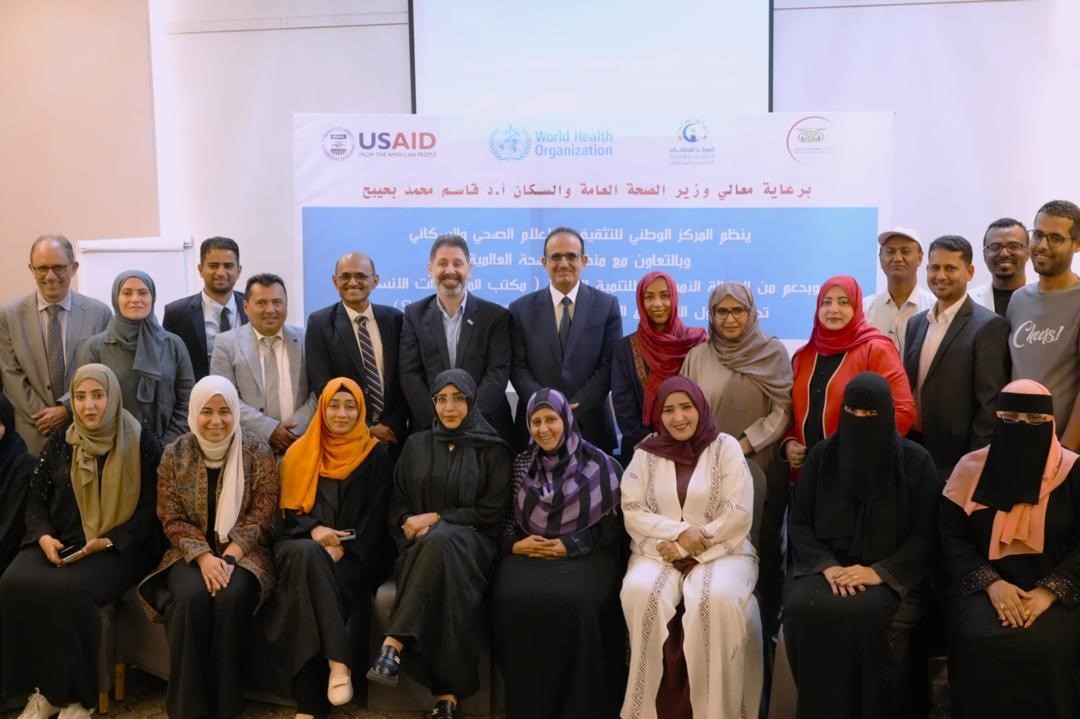 26 February 2025, Aden, Yemen – An infodemic is when too much information, including false and misleading information, circulates in digital and physical environments during a disease outbreak. Infodemics can cause confusion and risk-taking behaviours that can harm health, lead to mistrust in health authorities and undermine the public health response.
26 February 2025, Aden, Yemen – An infodemic is when too much information, including false and misleading information, circulates in digital and physical environments during a disease outbreak. Infodemics can cause confusion and risk-taking behaviours that can harm health, lead to mistrust in health authorities and undermine the public health response.
To address the challenges posed by infodemics, the World Health Organization (WHO) Yemen Country Office, in collaboration with the WHO Regional Office for the Eastern Mediterranean and the Ministry of Health in Aden, conducted a comprehensive training on social listening and infodemic management between 2 and 6 February 2025.
The training, which was held in 2 parts, brought together 55 participants from the Health Education Centre in Aden, the Ministry of Health, health promoters from 10 governorates, UN agencies and nongovernmental organizations. Sessions were designed to equip participants with the skills needed to effectively manage infodemics and use social listening tools to generate actionable insights and combat misinformation during health emergencies.
The training included:
Introduction to infodemic management
Understanding the impact of infodemics on public health and integrating infodemic management into health systems.
Social listening and insights generation
Differentiating social listening from infodemic insights, and generating insights reports.
Digital social listening
Techniques for analysing social media data, ethical considerations and tools for effective digital listening.
Using taxonomies for infodemic management
Applying taxonomies to improve health responses, with a focus on diseases like cholera and dengue.
The training was adapted from a global package developed by WHO which was then customized to address regional and country-specific challenges in Yemen. Local case studies, Arabic-language materials and culturally relevant examples were incorporated to ensure the training was applicable to the Yemeni context.
Training outcomes included:
Knowledge gains
Participants demonstrated a significant increase in their understanding of social listening tools and infodemic insights generation.
Improved skills
Participants enhanced their ability to analyse data and integrate insights into health responses.
Confidence in application
The vast majority – 75% and 80% – of participants across the 2 parts of the training felt confident or very confident in applying the skills they had learned to manage misinformation and public concerns during health emergencies.
Participant feedback was positive, with 85% and 90% of participants describing it as excellent or very good. Participants appreciated the interactive approach and hands-on exercises but suggested extending training duration and improving internet connectivity for future sessions.
The training has laid a strong foundation for strengthening Yemen’s capacity to manage infodemics and respond to health emergencies effectively.
To capitalize on this momentum and ensure sustainability, WHO plans to:
Continue collaborating with the Ministry of Health in Yemen to integrate infodemic management into national health emergency response plans
Participants will be provided with ongoing support and mentorship, developing localized resources and tools and fostering a community of practice for knowledge sharing and continuous learning.
Roll out the training in other countries in the Eastern Mediterranean Region
Adapting the programme to meet specific country needs will ensure that a wide range of health professionals are equipped with the skills and knowledge needed to effectively manage infodemics and combat misinformation during health emergencies.
Continue refining the programme to address evolving public health challenges
To ensure the programme remains relevant and impactful, lessons learned from Yemen and other countries will be incorporated and training content adapted to address emerging threats and challenges and stay abreast of the latest trends in infodemic management.


